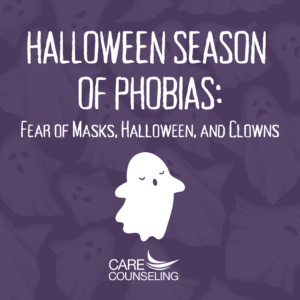Halloween Season of Phobias: Fear of Masks, Halloween, and Clowns
 Phobias involve intense fears. Many of the common phobias such as fears related spiders, darkness, and blood can be triggered by cues around Halloween. While many of these fears are also quite common in childhood, they can trigger overwhelming anxiety and panic in children and adults of all ages. Specific phobias include maskaphobia or the fear of masks and samhainophobia, the fear of Halloween.
Phobias involve intense fears. Many of the common phobias such as fears related spiders, darkness, and blood can be triggered by cues around Halloween. While many of these fears are also quite common in childhood, they can trigger overwhelming anxiety and panic in children and adults of all ages. Specific phobias include maskaphobia or the fear of masks and samhainophobia, the fear of Halloween.
Seeing people in masks and costumes can be especially triggering for those with maskaphobia and all the Halloween-related content can be triggering in general. While children may be comfortable seeing characters and masks on television, seeing a live person in costume can be overwhelming. Young children have difficulties distinguishing between fantasy and reality, and gradually begin to understand the difference as they enter the preschool and school-age years.
Working with elementary-aged children in the public school system, I noticed recurring themes that I noticed were strong-fear-based responses to characters featured on TV and social media such as Chucky and Slenderman. Many of the children enjoyed going out trick-or-treating but also reported some scary and sometimes traumatic responses from teens and adults who enjoyed scaring children with scary masks, blood, gore, and loud disturbing noises. The children’s understanding of the characters seems to vary depending on age and developmental level.
Kids would come to school as hypervigilant and would present themselves as anxious, clingy, and fearful. Trembling, hiding, fear of the dark, somatic complaints, and difficulty sleeping were common. Other children thought horror scenes were “funny”, narrating scenes such as chainsaw massacres, but their little bodies would freeze in response items that would trigger fear.
One item that I originally had in my school-based playroom that had to go because it was too triggering was a play dough clown set. It was a direct reminder to “evil” and “killer clowns” of a creepy clown epidemic.
I got rid of these items as they would send children into a state of panic/ fear. I learned that there are quite a few people specifically terrified of clowns. A phobia specific to the fear of clowns is called coulrophobia. Factors that psychologists believe may contribute to fear of clowns include the difficulty of distinguishing between genuine emotions and the unpredictable, erratic nature of clowns.
There are things you can do when your child is afraid of Halloween. Keep in mind that these strategies are also helpful for adults. In addition, exposure therapy is often used to treat phobias.
- Gradually face feared stimuli within the context of safety.
Examples include being in a familiar or controlled environment such as a daytime truck-or-treat event or community center event.
- Increase a sense of safety by being with a trusted adult(s) and/ or a group of peers.
- Help adults and children manage fears by teaching relaxation and learning self-regulation.
- Be prepared by knowing what to expect (e.g., before going into a haunted house).
- Limit exposure to overwhelming experiences by gradually building tolerance that is developmentally appropriate such as watching “scary movies”.
- Follow age guidelines for the viewing of media and attendance of frightening events.
- Have opportunities to debrief/ talk about the experiences.
- Find enjoyable alternatives such as harvest celebrations in place of Halloween.
Written By: Charlotte Johnson, MA, LPCC



























